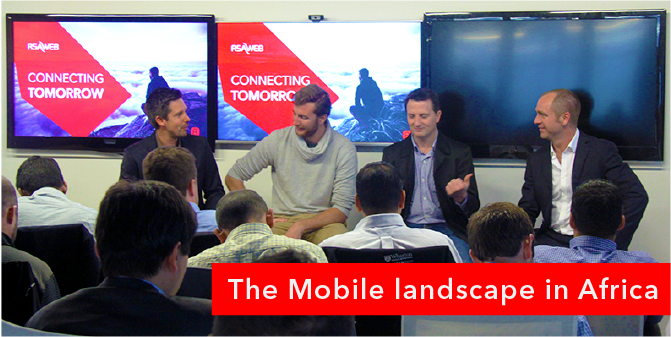The Mobile landscape in Africa
RSAWEB recently hosted a panel discussion with three of South Africa’s leading mobile companies: Clickatell, SnapScan and WiGroup. Our intrepid founder and managing director, Rob Gilmour, hosted the panel discussion which was attended by a group of 20 executive MBA students from The Wharton University based in Philadelphia, PA.
The panel included Cassie De Villiers, Co- founder of Clickatell; Rupert Sully, Head of New Business Development at SnapScan; and Howard MoodyCliffe, Head of Marketing and International from WiGroup.
Some background on our panel guests:
The landscape of mobile business is changing in South Africa and globally. According to Business Tech’s article there were a reported 20 million smartphone users in South Africa in 2014 and globally 73% of the world owns a mobile phone, whereas only 22% own a smartphone, 11% own a laptop, and 6% a tablet. WiGroup International also note in their article ‘Your business can’t afford to ignore mobile’, that in 2014, 51 million people were accessing the Internet via their phones in South Africa, making mobile phones the primary access point for the World Wide Web in the country.
– Clickatell is the world’s leader in bulk SMS gateways with more than 800 networks and thousands of customers around the world. Through Clickatell’s platform you can send and receive messages (SMS’s) to customers anywhere in the world. Started in South Africa in 2000, their Head Offices are now in California, USA.
– SnapScan is a simple, easy-to-use smartphone payment app that allows for secure, cardless payments through the use of QR codes and URLs. Partnered and backed by Standard Bank, SnapScan is still in its early-stage startup phase and is solely focusing business efforts on the South African market.
– WiGroup International is a platform provider specialising in point-of-sale (POS) integrated mobile transacting. Founded in 2007, the company’s headquarters are in Cape Town, South Africa.
The challenges faced by the mobile landscape in Africa
The panel discussion focused on how the mobile landscape is changing and what it is like to work in this sector within South Africa and Africa. As Rob Gilmour summarised, “The three main challenges of doing business in Africa are currency, culture and communication.”
Overcoming challenges
As we all know, culture is both a hurdle and potentially a differentiating factor for many businesses. There was general consensus within the panel of experts that companies find cross-border challenges to be even more difficult to overcome than cultural challenges. However, the overarching feeling from the day was that the culture in South Africa lends itself to the establishment of thriving tech startups due to the availability of great local skills and talent, a receptive market, and, most importantly, the increased use of mobile phones, both smartphones and feature phones.
Trends within the industry
It was agreed amongst the panelists that the trend within the ecosystem of tech startups is a self-fulfilling prophecy: the wealthy (individuals with startup capital; self-funded or other) create products or services that service the wealthy. However everyone felt that the real opportunity lies in the untapped market: the millions of users in the lower segments of the market.
Consumers demanding more
In summary all of the panelists agreed that consumers are demanding more from their phones everyday: from being to be able to search for the closest restaurant or taxi on their phones, to being able to make a payment without needing a credit card or to claim a discount on their mobile phone. Our phones are taking the guess-work out of everyday life and no company can ignore the growing impact that the mobile culture has and is going to have on them. Coupled with the rapid growth of smartphone technology, and the decrease in mobile pricing, Africa is now the prime market for companies looking to make the most of the power of mobile in business.
For more info on RSAWEB’s mobile offering, click here.
Here is another article we wrote on mobile connectivity for business.



